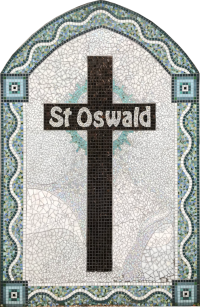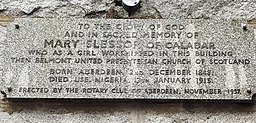11th January – and we remember a most remarkable woman.
For courage, vision and leadership are found in the most unlikely of places.
Mary Slessor was born in Aberdeen in December 1848, into a wretchedly poor family. Her father was an alcoholic who lost his job as a shoemaker. Mary was the second of seven children, and in 1859 they moved from Aberdeen into the fetid slums of Dundee. Her father and mother worked in the mills, and Mary joined them there when she turned 11.
When Mary’s father and both brothers died of pneumonia, Mary’s mother struggled on to keep Mary and her two sisters alive. By the time Mary was 14 she was doing a 12-hour day as a jute maker.
But life was not all drudgery. Mary’s mother was a devout Christian who read the family Bible to her daughters, and also the Missionary Record, a monthly publication from the United Presbyterian Church. The stories of the missionaries captivated Mary. When she heard that David Livingstone, the great missionary explorer, had died, she decided that she would follow in his footsteps. She wanted to devote her life to taking the gospel to Africa. She was 25.
In August 1876 the Presbyterians sent her out to Calabar, Nigeria, an area where no European had ever yet set foot. With her red hair and blue eyes, Mary grabbed attention wherever she went, but despite recurring illness and constant danger, Mary settled happily among the tribes. She learned their traditions, quickly becoming fluent in their language, Efik. Soon she won the confidence of their tribal leaders. She taught their children and was soon determined to put an end to some of their barbaric practises, such as the killing of twins (whom they thought were evil).
Over the years Mary put an end to many witchcraft practises, and she adopted every twin child she found abandoned. And she talked endlessly about Jesus Christ, the passion of her life.
Mary was tough – she made long trips through the jungles and took canoes up remote rivers. When her shoes gave out, she went barefoot. Her great passion was to go to ‘the regions beyond’ with the Gospel. She thrived in places and among people who would have terrified most women in her day.
It has been written of her: “Practically singlehanded she tamed and transformed three pagan communities in succession. It is a question if the career of any other woman missionary has been marked by so many strange adventures, daring feats, signal providences, and wonderful achievements.” (Dr Robert H. Glover, The Progress of World-Wide Missions.)
When in 1901 Southern Nigeria became a British Protectorate, Mary was appointed the first ever female Magistrate in the British Empire. She became a skilful diplomatic emissary. She was known for saying: “It is not Mary Slessor, but God and our united prayers that have brought the blessings to Calabar. Christ shall have all the honour and glory for the multitudes saved.”
When she finally died of fever in January 1915 the native Christian girls and women wept bitterly: “Our mother is dead. Everybody’s mother has left us.”
Mary Slessor once wrote to a friend who had long prayed for her: “I have always said that I have no idea how or why God has carried me over so many funny and hard places, and made these hordes of people submit to me, or why the Government should have given me the privilege of a Magistrate among them, except in answer to prayer made at home for me. It is all beyond my comprehension.”
Photo: watty62, CC BY-SA 4.0 https://creativecommons.org/licenses/by-sa/4.0, via Wikimedia Commons

